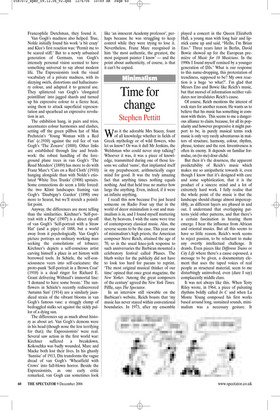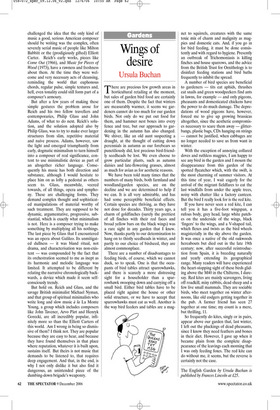Time for change
Stephen Pettitt
Was it the adorable Mrs Stacey, fount of all knowledge whether in fields of Greek mythology or of wild flowers, who let us know? Or was it dull Mr Jenkins, the Welshman who could never stop talking? Whoever it was, it was a piece of knowledge, transmitted during one of those lessons we called ‘sums’, that implanted itself in my prepubescent, arithmetically eager mind for good. It was the truly amazing fact that anything times nothing equals nothing. And that held true no matter how large the anything. Even, indeed, if it were an infinite anything.
I recall this now because I’ve just heard someone on Radio Four say that in the world of decor minimalism is out and maximalism is in, and I found myself muttering that, by heavens, I wish the same were true of contemporary classical music. Alas, the reverse seems to be the case. This year one of minimalism’s high priests, the American composer Steve Reich, attained the age of 70, so in the usual knee-jerk response to such anniversaries the Barbican mounted a celebratory festival called Phases. The blurb writer for the publicity did not have to look too hard for paeans to reprint. ‘The most original musical thinker of our time’ opined that once great magazine, the New Yorker. ‘Among the great composers of the century’ agreed the New York Times. Piffle, says The Spectator.
In an interview still viewable on the Barbican’s website, Reich boasts that ‘my music has never stayed within conventional boundaries. In 1973, after my ensemble played a concert in the Queen Elizabeth Hall, a young man with long hair and lipstick came up and said, “Hello, I’m Brian Eno.” Three years later in Berlin, David Bowie showed up for the European première of Music for 18 Musicians. In the 1990s I found myself remixed by a younger generation of DJs.’ What is our response to this name-dropping, this protestation of trendiness, supposed to be? My own reaction is a huge ‘so what?’. I’m glad that Messrs Eno and Bowie like Reich’s music, but that morsel of information neither validates nor invalidates Reich’s cause.
Of course, Reich mentions the interest of rock stars for another reason. He wants us to believe that his music has something in common with theirs. This seems to me a dangerous alliance to claim, because, for all its popularity and however progressive it might purport to be, in purely musical terms rock music is only very rarely adventurous in matters of structure, harmony, colour, rhythm, phrase, texture and the rest. Inventiveness is often its enemy. It depends on familiar formulae, on (to me) dour cliché.
But then it’s the dourness, the apparent predictability of Reich’s music which makes me so antipathetic towards it, even though I know that it’s designed with care and some sophistication, that it is the product of a sincere mind and a lot of extremely hard work. I fully realise that the whole point of the music is that the landscape should change almost imperceptibly, as different layers are phased in and out. I understand that overlapping patterns yield other patterns, and that there’s a certain fascination in hearing them emerge. I hear the influence from African and oriental musics. But all this seems to have so little reason. Reich’s work seems to reject passion, to be reluctant to make any overtly intellectual challenge. It drawls. Even pieces like Different Trains or City Life where there’s a cause espoused, a message to be given, a documentary element that uses the taped voices of real people as structural material, seem to me disturbingly uninvolved, even (dare I say) complacently middle class.
It was not always like this. When Terry Riley wrote, in 1964, a piece of pulsating rhythms boldly called In C and when La Monte Young composed his first works based around long, sustained sounds, minimalism was a necessary gesture. It challenged the idea that the only kind of music a good, serious American composer should be writing was the complex, often severely serial music of people like Milton Babbitt or the (prodigiously gifted) Elliott Carter. Reich’s early works, pieces like Come Out (1966), and Music for Pieces of Wood (1973), have a rawness and freshness about them. At the time they were welcome and very necessary acts of cleansing, reminding the world that euphonous chords, regular pulse, simple textures and, hell, even tonality could still form part of a composer’s armoury.
But after a few years of making these simple gestures the problem arose for Reich and his two fellow travellers and contemporaries, Philip Glass and John Adams, of what to do next. Reich’s solution, and the solution adopted also by Philip Glass, was to try to make ever larger structures from slim, repetitive material and naive process. Adams, however, saw the light and emerged triumphantly from early, dogmatic minimalism to turn himself into a composer of real significance, content to use minimalistic device as part of an altogether richer language. Consequently his music has both direction and substance, although I would hesitate to place him on as lofty a pedestal as others seem to. Glass, meanwhile, veered towards, of all things, opera and symphony. These are challenging forms. They demand complex thought and sophisticated manipulations of material worthy of such treatment. They are supposed to be dynamic, argumentative, progressive, substantial, which is exactly what minimalism is not. Here is a composer trying to make something by multiplying all his nothings. The last piece by Glass that I encountered was an opera about Galileo. Its unmitigated dullness — it was bland ritual, not drama, and characterisation was non-existent — was compounded by the fact that its orchestration seemed to me as inept as its harmonic and melodic language was limited. It attempted to be different by relating the narrative chronologically backwards, a device which made it seem selfconsciously trendy.
But hold on. Reich and Glass, and the savage British minimalist Michael Nyman, and that group of spiritual minimalists who write long and slow music à la La Monte Young, a group which includes composers like John Tavener, Arvo Pärt and Henryk Gorecki, are all incredibly popular, infinitely more so than the Elliott Carters of this world. Am I wrong in being so dismissive of them? I think not. They are popular because they are easy to hear, and because they have found themselves in that place where reputation, whatever it is built upon, sustains itself. But theirs is not music that demands to be listened to, that requires deep engagement. And that, in the end, is why I not only dislike it but also find it dangerous, an unintended piece of the dumbing-down brigade’s weaponry.



























































































 Previous page
Previous page